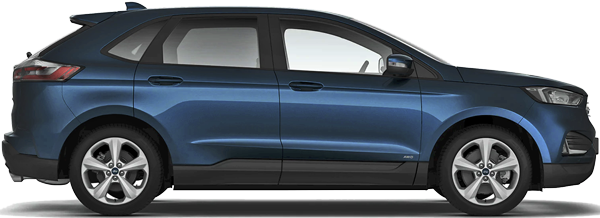The Comparative Analysis :
Mercedes EQC 400 4MATIC (19 - ..) vs. Ford Edge 2.0 EcoBlue 4x2 Automatic (19 - ..)
€ 71,300

€ 45,700

€ 71,300
Base Price ⓘBase price of a new vehicle with standard equipment in Germany at market launch.
€ 45,700
ⓘBase price of a new vehicle with standard equipment in Germany at market launch. Price Info
Vehicle Dimensions
The Mercedes EQC 400 is considerably smaller in every dimension. It's 6.5 cm shorter, 4.4 cm narrower and 12.7 cm lower than the Ford Edge 2.0 EcoBlue.
Mercedes EQC 400
Ford Edge 2.0 EcoBlue
1624
1884
2096
1751
1928
2184
1884 mm
Width
1928 mm
2096 mm
Width Incl. Mirrors
2184 mm
1624 mm
Height
1751 mm
2873
4762
2848
4827
4762 mm
Length
4827 mm
2873 mm
Wheelbase
2848 mm
Vehicle Weight
Mercedes EQC 400
Ford Edge 2.0 EcoBlue
2495 kg
Kerb Weight
2007 kg
2940 kg
Gross Vehicle
Weight
Weight
2565 kg

Weight Difference:
488 kg
19.56 %

General
Mercedes EQC 400
Ford Edge 2.0 EcoBlue
N293
Generation
SBF
Sport Utility Vehicle
Car Body Style
Sport Utility Vehicle
Electricity
Fuel Type
Diesel

Permanent all-wheel drive
Drive
Front-wheel drive

1-speed automatic transmission
Transmission
8-speed automatic transmission
Engine
Mercedes EQC 400
Ford Edge 2.0 EcoBlue
Asynchronous motor
Engine Type
Straight-four diesel engine with turbocharger
0
Valves
4
0
Cylinders
4
0 CC
Engine Capacity
1995 CC
402 bhp
at 0 rpm
Power
148 bhp
at 3500 rpm
Mercedes EQC 400
402 bhp
148 bhp
Ford Edge 2.0 EcoBlue
760 NM
at 0 rpm
Max. Torque
370 NM
at 2000 rpm
Mercedes EQC 400
760 NM
370 NM
Ford Edge 2.0 EcoBlue
Performance
Mercedes EQC 400
Ford Edge 2.0 EcoBlue
112 mph
Maximum Speed
115 mph
5.1 sec
Acceleration 0 to 62 mph
11.2 sec
62 mph
62
mph
mph
71 m
0.000 sec

Mercedes EQC 400
62 mph
62
mph
mph
156 m
0.000 sec

Ford Edge 2.0 EcoBlue
▶ REPLAY
6.21 kg/bhp
Weight-to-Power Ratio
13.56 kg/bhp
Mercedes EQC 400
6.21 kg/bhp
13.56 kg/bhp
Ford Edge 2.0 EcoBlue
Fuel Economy / Emissions
Mercedes EQC 400
Ford Edge 2.0 EcoBlue
Fuel Economy
32 kWh✽
( 126 MPGe ⓘ Miles per gallon petrol equivalent (MPGe) is a measure of the average distance traveled per unit of energy consumed. MPGe, specified in miles per imperial gallon (~4.546 litres), is used to compare the energy consumption of vehicles that use different energy sources.)
combined ✽ per 100 miles
49 mpg
( 55 MPGe ⓘ Miles per gallon petrol equivalent (MPGe) is a measure of the average distance traveled per unit of energy consumed. MPGe, specified in miles per imperial gallon (~4.546 litres), is used to compare the energy consumption of vehicles that use different energy sources.)
Mercedes EQC 400
126 MPGe
55 MPGe
Ford Edge 2.0 EcoBlue
No data
city
39 mpg
No data
motorway
54 mpg
80 kWh
Fuel Tank Capacity
64 L
252 mi
Range
685 mi
Mercedes EQC 400
252 mi
685 mi
Ford Edge 2.0 EcoBlue
Environmental Impact
64.1 kWh
Total Energy Consumption
per 100 miles ⓘThe total energy consumption per 100 miles is the amount of energy consumed by a vehicle when burning fuel or using electricity per 100 miles (final energy), and the energy required to produce the appropriate amount of fuel or electricity (primary energy).
per 100 miles ⓘThe total energy consumption per 100 miles is the amount of energy consumed by a vehicle when burning fuel or using electricity per 100 miles (final energy), and the energy required to produce the appropriate amount of fuel or electricity (primary energy).
119.3 kWh
Mercedes EQC 400
64.1 kWh
119.3 kWh
Ford Edge 2.0 EcoBlue
Elektrofahrzeug
Emission Standard
Euro 6d-TEMP-EVAP-ISC (WLTP) 36CH, 36CI, 36DG
0 g/km (WLTP)
CO2 Emissions
153 g/km (NEFZ)
Practical Convenience
Mercedes EQC 400
Ford Edge 2.0 EcoBlue
5
Doors
5
5
No. of Seats
5
445 kg
Maximum Payload
558 kg
500 L
Boot Capacity
602 L










1460 L
Boot Capacity (Seats Down)
1847 L























